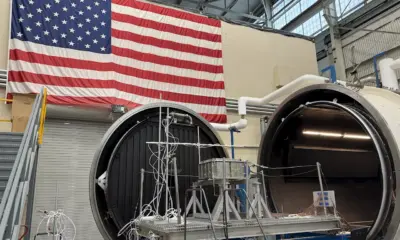Science
Blue Origin Successfully Launches Twin Mars Orbiters on New Glenn

Blue Origin has successfully launched its heavy-lift rocket, the New Glenn, on October 5, 2023, carrying two NASA spacecraft aimed at studying the Martian atmosphere. This milestone event took place at Cape Canaveral, Florida, marking a significant step in the ongoing exploration of Mars.
The launch involved the deployment of two orbiters, which are designed to gather critical data about the Martian atmosphere. These spacecraft will provide valuable insights into the planet’s weather patterns, climate, and potential for future exploration. The mission underscores NASA’s commitment to understanding Mars as a precursor to potential human habitation.
The New Glenn rocket, named after the famed astronaut John Glenn, represents a new era in space exploration. With its ability to carry heavy payloads, it plays a crucial role in facilitating ambitious missions such as this one. Blue Origin’s innovative approach to rocket design and reusable technology is expected to enhance the efficiency of future space operations.
NASA officials expressed their enthusiasm for the mission. “This launch is a vital step in our quest to understand Mars,” said Thomas Zurbuchen, Associate Administrator for the Science Mission Directorate at NASA. “The data collected by these orbiters will help us learn more about the Martian atmosphere and its evolution over time.”
The twin orbiters will enter different orbits around Mars to effectively study its atmospheric dynamics. One orbiter will focus on understanding seasonal changes in the Martian atmosphere, while the other will investigate the planet’s atmospheric escape processes. This dual approach is expected to yield comprehensive data, enhancing our understanding of Mars’ climate and its potential for supporting life.
The successful launch also highlights the growing partnership between private aerospace companies like Blue Origin and government entities such as NASA. This collaboration is crucial for advancing space exploration, reducing costs, and achieving ambitious scientific goals.
Following the launch, the mission team will monitor the progress of the spacecraft as they journey to Mars. The orbiters are expected to arrive at their destination in about six months, where they will begin their scientific tasks. As the world watches, the findings from this mission could significantly contribute to our understanding of not only Mars but also the broader cosmos.
In conclusion, the launch of the twin orbiters aboard the New Glenn rocket marks a pivotal moment in space exploration. With NASA’s commitment to advancing our knowledge of Mars and Blue Origin’s innovative rocket technology, the future of interplanetary research looks promising.
-

 Science2 weeks ago
Science2 weeks agoNostradamus’ 2026 Predictions: Star Death and Dark Events Loom
-

 Technology1 month ago
Technology1 month agoOpenAI to Implement Age Verification for ChatGPT by December 2025
-

 Technology6 months ago
Technology6 months agoDiscover the Top 10 Calorie Counting Apps of 2025
-

 Health4 months ago
Health4 months agoBella Hadid Shares Health Update After Treatment for Lyme Disease
-

 Health4 months ago
Health4 months agoAnalysts Project Stronger Growth for Apple’s iPhone 17 Lineup
-

 Health4 months ago
Health4 months agoErin Bates Shares Recovery Update Following Sepsis Complications
-

 Technology4 months ago
Technology4 months agoElectric Moto Influencer Surronster Arrested in Tijuana
-

 Technology5 months ago
Technology5 months agoDiscover How to Reverse Image Search Using ChatGPT Effortlessly
-

 Technology6 months ago
Technology6 months agoMeta Initiates $60B AI Data Center Expansion, Starting in Ohio
-

 Technology6 months ago
Technology6 months agoRecovering a Suspended TikTok Account: A Step-by-Step Guide
-

 Education4 months ago
Education4 months agoHarvard Secures Court Victory Over Federal Funding Cuts
-

 Technology2 months ago
Technology2 months agoDiscover 2025’s Top GPUs for Exceptional 4K Gaming Performance




















